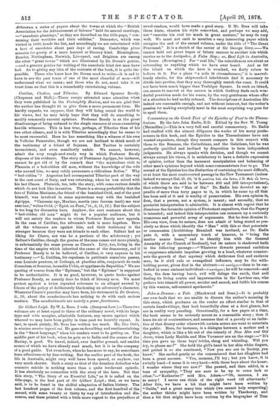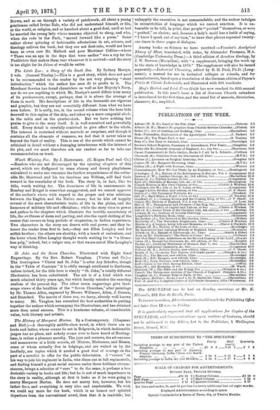John-a-Dreams : a Tale. (Blackwood and Sons.)—It is probably our
own fault that we are unable to discern the author's meaning in this story, which produces on the reader an effect similar to that of certain handwritings, that look beautifully clear at a first glance, but are in reality very puzzling. Occasionally, for a few pages at a time, the book seems to be seriously meant as a reasonable story ; then it loses its air of vraise»zblance, and assumes that of a parody or an imita- tion of that dreary order wherewith certain actors are wont to entertain the public. Here, for instance, is a dialogue between a mother and a daughter, which is like a bit out of the comedy of New Men and Old Acres, when Lady Matilda and Miss Vavasour are on the stage 1—" It's time you gave up these boys' tricks, slang and whistling. Will you try, to please me ?" She held the girl's hand in her slim white fingers, and patted it as she continued, "Now you are out in Society, you know." She smiled gently as she remembered that her daughter had been a great success. "Yes, mamma, I'll try ; but you know, it is awfully hard—I mean it is very hard—with those boys about the house.. I wonder where they are now ?" She paused, and then added, in a tone of sympathy, "They are sure to be up to some lark or other."—" Katharine!" said Mrs. Adare.—" Oh, mamma, I am so sorry! I never can think of the right word till afterwards." After this, we have a bit that might have been written by "Guide," and a great many bits which (we cannot help suspecting) the author thinks might have been written by Thackeray, and then a bit that might have been written by the biographer of Tom Brown, and so on through a variety of patchwork, all about a young gentleman called Irvine Dale, who did not understand himself, or life, or the world, or religion, and so knocked about a good deal, until at last he married the young lady whose mamma objected to slang, and who, when she rode in the Park, "moved forward like a poem." Some rather clever quizzing of fashionable affectations in art, science, and theology enliven the book, but they are not first-rate, would not have been so even ante Mr. Mallock and poor Mortimer Collins—whose "There was an ape in the days that were earlier" was a rap for the Positivists that makes them roar whenever it is revived—and the story is too slight for its bison of would-be satire.



































 Previous page
Previous page